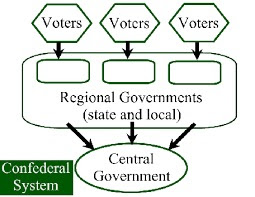The dilemma attached to today's most aggressive agitation for a confederacy as one of the options in restructuring Nigeria, championed by some regional political, tribal and religious leaders in a federalist Nigeria is not as feasible as the proponents think.
Confederation as the name implies refers to the loose association of independent and sovereign states, which goes beyond the context of alliance by establishing some common political and administrative organs but without setting up central governmental authorities.
Historically, Nigerian federalism began during the period of the colonial Governor-General Sir Bernard Bourdillon, he was the first to initiate and laid a foundation of federalism in 1939 by creating three provinces, this is to allow governmental powers that exists to be shared between the central government and its component units (states and local governments).
The constitution was drafted and enacted by Governor- General Sir Arthur Richard in 1946, thus Nigeria became a federal colonial state. By the time that Nigeria had declared itself a Republic and replaced the post of Governor-General with the post of President, a national bicameral parliament was established and the country was considered a federation of three regions. After the counter coup of July, 1966, Nigeria was reorganized as a federal country, by dividing the three regions into twelve states. Subsequent military governments continued the reorganization of the regions up to the current thirty six operational states and 774 local governments arrangement.
Nations world-over, faces enormous internal challenges of integration, mutual understanding, harmony, cohesion, compromise, compassion tolerance, and sacrifice. This is usually due to diverse nature of people that formed part of that nation such as religion, ethnicity and culture, and sometimes issues such as marginalization play a key role, as others might felt relegated to second class citizens, with discrepancies in power sharing, revenue sharing, appointments among others, which can easily be address through constitutional means other than threat of secession and call for confederal government. Unable to appreciate the integration efficacy of federalism by some Nigerians whose motives usually are self-serving, the post colonial Nigeria have seen enormous call for realignment including secession and confederation by these forces. Not weighing the intricacies of confederacy, these proponents were today spontaneously advocating for a confederate Nigeria. The intricacies is that state often may secede from confederacy if their own governments or voters so desired, whereas such secession is not permitted in a federal union. That is, it could be easy to transform from a system of confederation to federalism, it would be impossible to revert from the latter to the former. The political history of America present an illustration. While the fusion of the original thirteen confederal states into a federal union was achieved through active debate and persuasions, the attempted secession of the south became a matter of war.
Although Nigerian federalism was a creation of British colonialism, and inspite of the fact that each of the major groupings had at one time or another threatened to secede. It took three years of warfare to defeat the Biafran agitators, and bring them back to the federal union. The explanation is that the economic and political considerations which tend to encourage confederal states to form federal unions, provide the same reasons why federal unions may be most unwilling to acquiesce in voluntary disintegration. Again, there is the problem of demarcating the nation into confederal units. Nigeria is today a federation of thirty six states, most of which are not economically viable. It is to be doubted if the confederalists would be anticipating a confederation of such units, nor would some of the states be easily persuaded to revert to the old regional setup. The creation of states has accorded the so-called minority groups a position of political autonomy that would be jealously protected from the envy of their former partners. For instance, the people of the Rivers and Cross Rivers were known to have agitated for the creation of Calabar-Ogoja-Rivers state since the 1940s. Isaac Adaka Boro among others led the people of this area to declare a "Delta Peoples Republic", but these people were more interested in securing their independence from the dominant Igbos, than breaking away from Nigeria.
Nevertheless, the issues provoking separatist agitations such as the confederacy and secession call for the re-appraisal of the Nigerian political system. The ongoing constitutional review shall be use as an opportunity to address grey areas that today become subject of discussion, and viewed by many as what has been holding Nigerian federalism aback, such provisions shall be amended or remove away to create more room for the continued peaceful existence of a united Nigeria, where harmony, tolerance, compassion, compromise, sacrifice and mutual understanding and respect for one another would be fostered. Our diversity shall be serve as a source of strength for our unity and prosperity.
mumarlere@gmail.
Wrote from Zaria

No comments:
Post a Comment